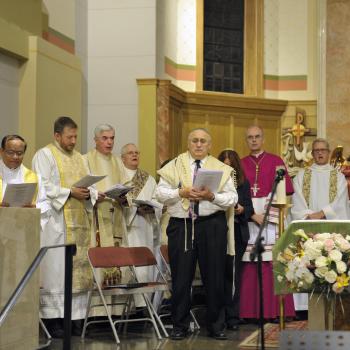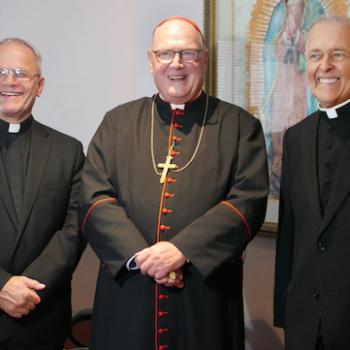That would be me.
As I do periodically, I decided today to change my password. I did. When I signed in again, a little box popped up saying that it looked like my name wasn’t authentic and I should change it.
I tried to sign in again, again using my three-name ID—Deacon Greg Kandra—and again the little box popped up saying, in effect, “No. Change it.” The box offered an unhelpful link to the Facebook name policy page.
So I changed it. It seemed easier than fighting with Facebook about it. Which is why my FB friends will now see me as “Greg Kandra.”
A few weeks back, priests were fuming about this development and some online were hinting that some form of religious discrimination was at work. (A petition was even launched to have the policy changed.)
But guess what? Now others are in the same boat:
Facebook’s strict “real name” policy is having an inadvertent effect on some Native American users, who are being banned from the service because the social media giant thinks their names are fake, according to a report from Colorlines.
Colorlines details several instances in which users with Native American names have been locked out of their accounts, with the social network demanding to see proof of ID before they are allowed back on the platform.
Facebook requires users to log in with the “name they use in real life,” though not necessarily their legal names. The rule is intended to clamp down on anonymous pseudonyms and role-playing accounts that impersonate or pretend to be other people.
“We require people to provide the name they use in real life,” the social network says on its help page. “That way, you always know who you’re connecting with.”
But the policy has had unintended consequences. In a blog post, Dana Lone Hill says that Facebook doubted the authenticity of her name, which is Native American in origin. She was told in a message that “it looks like the name on your Facebook account may not be your authentic name.”
Yeah. Sounds familiar. Read on to find out what followed.
It’s causing a lot of problems. The Washington Post noted the other day:
Native Americans says that human error is built into the system in a number of ways, and the result is a quiet marginalization of their identities.
To begin with, just about anyone can report an account based on the suspicion that someone is using a fake identity. And for that reason, Facebook can sometimes subject users to lengthy and repetitive requests to verify their identities, which can resemble a state of online purgatory.
When someone’s name is reported, a Facebook employee checks to see whether the name seems real — a subjective and apparently fraught process.
…After transgender and drag groups complained that the policy potentially exposed many of their communities to abuse and marginalization, Facebook apologized but didn’t really change the way the system fundamentally worked.
Even after the recent policy tweaks, the company said in its statement: “We have more work to do, and our teams will continue to prioritize these improvements so everyone can be their authentic self on Facebook.”
Heckuva job, Facebook. Heckuva job.
For the record: I’m Deacon Greg Kandra. I’m a deacon. People call me that. They also call me Deacon Greg. Sometimes, they call me Deacon Kandra. It is a part of my identity.
Facebook may not agree, but—as someone once put it—that’s the way it is.











